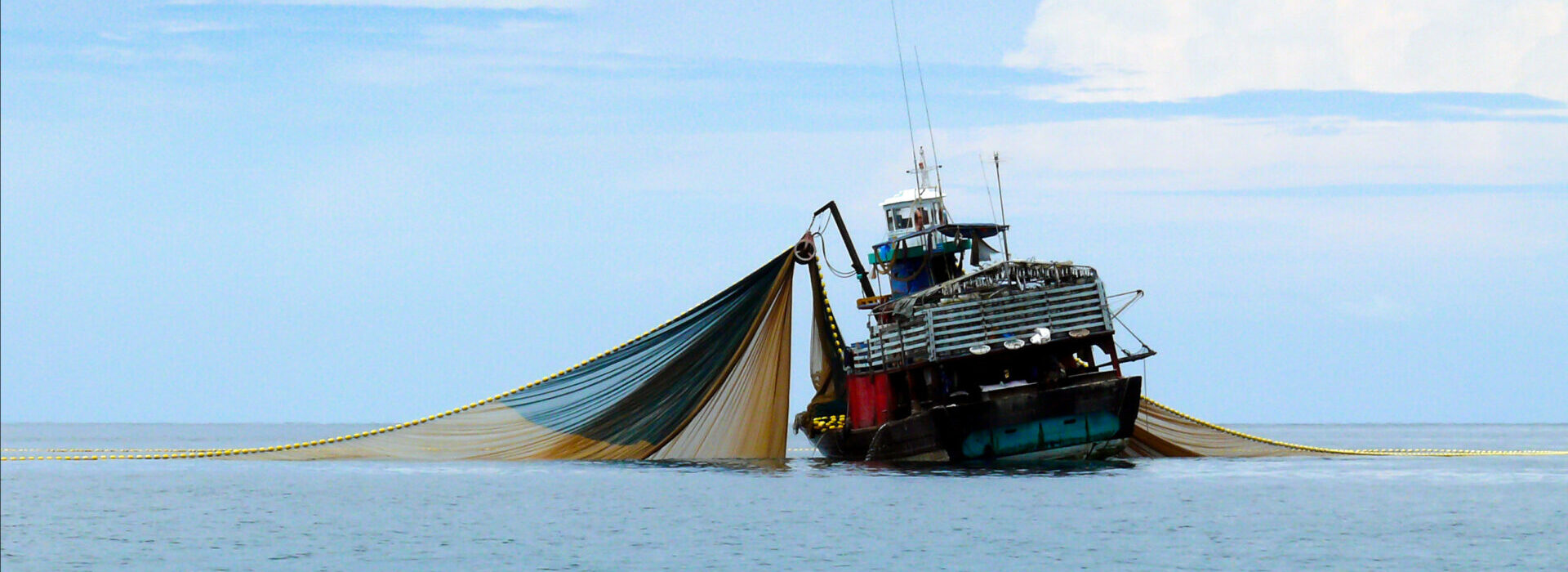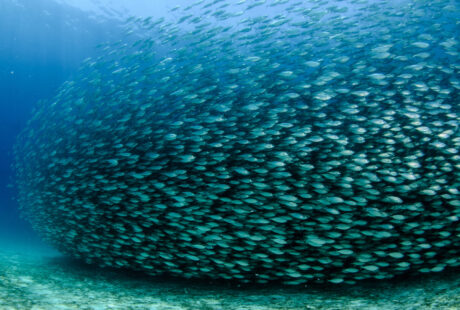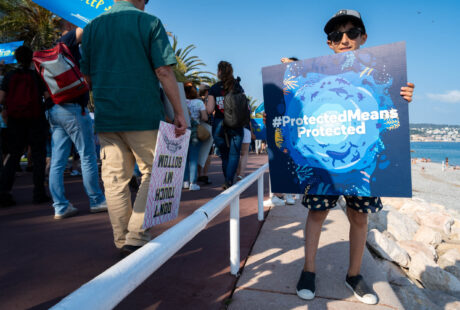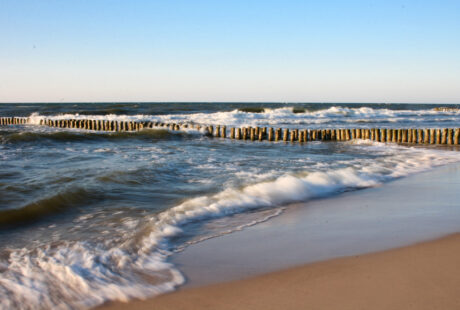The EU Fisheries Control Coalition applauds the positive steps taken by the European Parliament towards more transparent fisheries and traceable seafood. With their vote in plenary this week, EU parliamentarians have called for all fishing vessels to report everything they catch, including sensitive and protected species, which will make data for over 49,000 EU vessels available for the first time. Further, EU vessels will be tracked through electronic monitoring tools, seafood available in the EU market will be digitally traceable from net to plate, and EU Member States will be required to report more transparently on their control measures.
At the same time, the decision to significantly backtrack on accurate reporting of seafood catches casts a dark shadow over the voting outcome, as up to 40% of catches (and up to 50% in the case of tuna) may now be omitted from the EU fleet’s records. This would undermine scientific data to evaluate the status of fish stocks, could render fisheries control efforts ineffective, and will put the last decade of progress for seafood sustainability and marine species’ recovery at serious risk – as the European Commission itself has warned.
On behalf of the The EU Fisheries Control Coalition, Marta Marrero Martin, Director of Ocean Governance at The Nature Conservancy said: “Today, MEPs displayed the courage needed to turn the tide on overfishing by voting to make Remote Electronic Monitoring mandatory on vessels that are at a high risk of not complying with the rules. This is unfortunately overshadowed by the vote to extend the so-called ‘margin of tolerance’ for fishers, which will allow up to four in ten fish to go missing from the records, signaling a huge blow for sustainability. MEPs and Member States must urgently reverse this course in their upcoming negotiations, while also going one step further by ensuring that cameras record the incidental catch of sensitive and protected species.”
Andrea Ripol, Fisheries Policy Officer at Seas At Risk said: “Today’s vote is a mixed bag for dolphins, seabirds and turtles across the EU. Even though the mandatory collection of data on incidental catches in logbooks is a bold and promising step to help reverse biodiversity loss, the rejection of Remote Electronic Monitoring for data collection on sensitive species undermines its effectiveness, as it is an essential tool to ensure the data is recorded accurately.”
Katrin Vilhelm Poulsen, Senior Seafood Policy Officer at WWF European Policy Office said: “As the EU imports the majority of its seafood, the introduction of digital traceability from sea to plate will bolster the EU’s fight against illegal fishing and lay the groundwork for providing clear information to European consumers. However, this milestone achievement in the fight against illegal fishing internationally is undermined by the parallel decision to legalise underreporting for European vessels.”
Vanya Vulperhorst, Campaign Director, Illegal fishing and Transparency at Oceana said: “We welcome the outcome that all EU vessels – including 49,000 small-scale vessels – will have to report their catches and track their location, and that Member States can no longer hide information about their control efforts from the public. But MEPs’ foolish vote in favour of fishers underreporting up to 40% of their catches risks reversing decades of recovering fish populations.”
Steve Trent, Executive Director at the Environmental Justice Foundation said: “More transparent reporting by EU Member States on their fisheries controls and abolishing their veto to publish fisheries information mean the EU can continue to be a pioneer in the effort for a transparent global fisheries sector. Yet, crucially, the giant misstep of allowing four in ten fish to go missing from the records must now urgently be remedied by MEPs and Member States in their upcoming negotiations.”
Positive outcomes from the European Parliament vote include:
- Fishing vessels of 12 metres length or more that are at high risk of discarding unwanted catches (a violation of the EU Common Fisheries Policy) will be required to use Remote Electronic Monitoring, including CCTV cameras.
- Seafood products will need to be digitally traceable from the point of catch to the point of retail, with the same requirements for products sourced from EU and non-EU countries.
- Thanks to more transparent reporting provisions, European citizens and decision makers will have more information on how EU Member States implement EU fishing rules and manage fisheries resources.
- All EU fishing vessels – including over 49,000 small-scale vessels – are required to have a location tracker and to report their catches.
The negative aspects include:
- The increased margin of error that fishers have to estimate their catches will allow up to 40% of caught seafood to go missing from the EU fleet’s records; in the case of tuna, even up to 50% of catches may now never be reported.
- The requirement of Remote Electronic Monitoring (including CCTV) on vessels to monitor and curb the bycatch of sensitive species, including dolphins, seals and seabirds, has been rejected.
With the European Parliament’s position on the fisheries Control Regulation now adopted, Members of the European Parliament, the representatives from EU Member States and the European Commission are scheduled to begin negotiations to finalise the future fisheries control system later this summer.
It is crucial that the gains secured for sustainable fishing and healthy seas in Wednesday night’s vote are maintained in the trilogue discussions. However, both MEPs and EU Member States must urgently remedy the dramatic increase in the margin fishers receive to estimate their catches. The European Commission has warned that the 40-50% of catches missing from fishers’ logbooks could jeopardise the recovery of fish stocks in European seas, putting the future of fisheries at risk and stands in stark contrast to the goals of the European Green Deal. It is now up to EU parliamentarians, EU Member States and the Commission to make sure the robustness of our fisheries control system will not be undermined by this giant misstep.
ENDS
The EU Fisheries Control Coalition – The Environmental Justice Foundation, The Nature Conservancy, Oceana, Seas At Risk, and WWF, together with ClientEarth, The Fisheries Secretariat, Our Fish and Sciaena – is working to ensure that fisheries management in the EU safeguards ocean health and marine life for generations to come.
Notes to editors:
The fisheries Control Regulation is the cornerstone of how fisheries are controlled and monitored in the EU. This helps to ensure seafood is caught within sustainable limits and follows legal procedures, with direct impacts for Member States, fishers and consumers, as well as the health of marine ecosystems.
The revision process of the Regulation offers opportunities to make fisheries management more sustainable, address the lack of transparency on how the EU fleet is regulated and, as a result, increase profits for the sector. In addition, a strong future Control Regulation is key to stopping illegal fishing activities, which hurt fishers operating within legal boundaries.
Posted on: 11 March 2021



